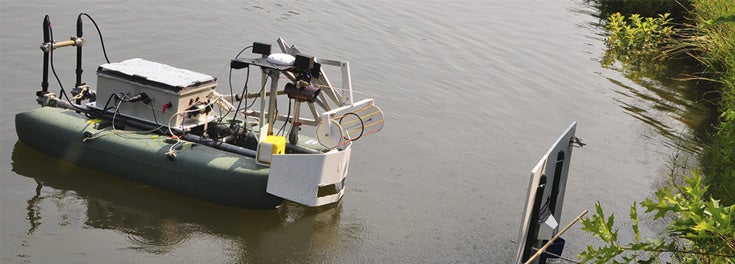
Students in URI’s ocean and electrical engineering programs are gearing up to defend their first-place title in June at the 2012 International RoboBoat Competition in Virginia Beach, Va. For an internationally recognized team that consistently finishes within the top five spots, the stakes are high, but so are the group’s enthusiasm and creativity.
Other teams navigated the buoy channel better than us, but none of them even attempted any of the other tasks. We preferred to try and fail than not try at all.
“These guys are willing to take a robot that won last year, and redesign and rebuild it completely, instead of just re-using it. That’s one of the remarkable things about our team – the engineering is more important to them than the winning,” said Ocean Engineering Professor Robert Tyce, who leads the team along with Associate Professor Bud Vincent.
RoboBoats are autonomous surface vehicles (ASV) that are judged on innovative design concept, rigorous engineering, construction, and ability to execute specific mission tasks. Last year, the team’s willingness to take risks helped put them in the top spot. “Other teams navigated the buoy channel better than us, but none of them even attempted any of the other tasks,” said ocean engineering major Hayden Radke. “We preferred to try and fail than not try at all.”
URI’s team – about 80 percent new this year – will compete against 19 teams from India, Taiwan, Indonesia, and the U.S. in a competition called “The Five-Card Draw.” Their ASV will have to demonstrate propulsion strength and speed, independently navigate an obstacle course, locate and actuate a red mushroom button, offload an amphibious vehicle that retrieves a poker chip, and trade cards in order to beat the hand of the dealer. And that’s just for starters.
Professor Tyce said that while other teams typically pride themselves on giving their ASVs a high level of independence, which can cause difficulty navigating the obstacle course, the URI team has traditionally focused on giving their ASV the best navigation system possible. And this year, electrical engineering students are also stepping up the vision capabilities of the robot.
Sounds like another winning year.
Related Links:
Association for Unmanned Vehicle Systems International Foundation
